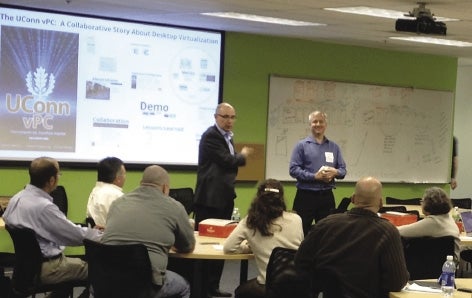Venture Funds Help Central Mass. Tech Manufacturers Grow
 Courtesy
Unidesk CEO Don Bulens, standing at left, and founder and chief technology officer Chris Midgley, address desktop virtualization with customers in higher education at a recent workshop.
Courtesy
Unidesk CEO Don Bulens, standing at left, and founder and chief technology officer Chris Midgley, address desktop virtualization with customers in higher education at a recent workshop.
Scroll down a list of venture capital deals with technology companies and it becomes evident that in Massachusetts, most of them happen in the Boston area.
But Central Massachusetts has its share of innovative IT and software firms, some of which are pulling in big dollars in pursuit of even bigger markets.
The following three companies have brought in a combined $95 million in venture funding in four years. They make software and equipment that backs up data and helps applications run smoothly at major companies around the world. With financial foundations and ideas to help simplify work for enterprise users, they are positioned to build on their momentum in 2013 and beyond.
SimpliVity: Cutting IT Clutter (Total Funding: $43 Million)
Westborough-based SimpliVity was founded in 2009, but stayed pretty quiet about what it was up to until this past summer, when it announced the launch of its IT infrastructure platform, the OmniCube.
One month later, it announced a $25-million venture round from Silicon Valley-based Kleiner Perkins Caufield & Byers, as well as existing investors Accel Partners and Charles River Ventures, bringing its total funding to $43 million — pretty big bucks in the Central Massachusetts venture capital community.
Tom Graves, marketing director, said the sleek unit wraps the functions of more than 10 different data-center appliances into one device at a lower cost and with higher functionality. He said the OmniCube handles networking, storage, de-duplication, compression, backup and a host of other functions that would normally be spread out across appliances.
Combining those functions into one device fits into an IT trend known as convergence.
"The large customer's problem is clutter: They've deployed appliances over time for a specific function," Graves said. "And they do it well. But over time, you have this sprawl. You have a different appliance for disaster recovery and a different one for other functions. They have all these disparate products that were never meant to work together."
The end result is higher maintenance costs and more difficulty upgrading, he said.
SimpliVity believes the OmniCube, which recently wrapped up its beta phase, will be leading the convergence pack, which includes other startups like Nutanix of San Jose, Calif. All are trying to chip away at the market dominance of the major IT hardware firms like Cisco, IBM and EMC.
SimpliVity got a nice plug in its product launch announcement during the summer from Jim Chilton, chief information officer for the Bedford-based North American division of software maker Dassault Systemes, one of SimpliVity's beta customers. Chilton said the OmniCube has the potential to simplify IT equipment, reduce costs and stop the overlapping upgrade cycle.
"The underlying OmniStack architecture is the most promising IT technology since virtualization," he said.
The first two quarters of 2013 will be "controlled growth" for SimpliVity, which now has about 80 employees, said Graves.
"As an early-stage company in transition out of development and into the commercialization phase of the product, there's a lot of work to be done, hiring to be done, and (the venture funding) is going to be the fuel for that," he said.
Correlsense: Keeping The Apps Running (Total Funding: $23 Million)
Before founding Framingham-based Correlsense Inc. in 2005, Oren Elias led a company that sold customer service software to call centers whose staff members would use it to look up information as they handled customer inquiries.
If the system went down, it was a big problem for the company, because it couldn't complete transactions. But when it did go down, figuring out exactly what was wrong was another matter.
"It was the classic case of what happens in enterprise IT: We supply the software but the customer was responsible for actually running it on their own infrastructure," Elias said. "So whenever something happened, the first question was 'Is it our fault or is it the customer's fault?'"
IT staff, focused on such areas as hardware, network, database and applications, would all take a crack at the problem with their various tools.
"Everyone kind of had their own tool and these tools had different data sets that didn't connect," Elias said.
The experience stayed with him, and after selling the company — Internative Solutions — Elias decided to focus on ways to better manage crucial business applications.
"These apps are only going to get more and more complex," he recalled thinking at the time. "And they did. This was 2005, well before the cloud boom."
Big-Name Customers
Correlsense's flagship product is application monitoring software called SharePath, which helps isolate problems and eliminate bottlenecks by analyzing many millions of application transactions per day for a given SharePath user. Its customers include Verizon, Geico and PayPal, among others.
The software is geared toward keeping business-critical applications running. Elias used the example of a small insurance company that uses an online quote system to attract customers.
"Their online quote system is critical for their business," he said. "They don't have a massive amount of agents running around and they have to make sure that's going to be one of their competitive advantages."
Correlsense has about 50 employees and has raised $23 million in venture funding, led by Accel Partners, including a $3-million round over the summer. Enterprise IT rises and falls in popularity among venture backers, Elias has noticed, but right now it seems to be doing well.
Correlsense competes with companies like DynaTrace, which was acquired by Compuware last year, as well as Hewlett-Packard and IBM.
Software companies are always working on product improvements, but Elias said Correlsense is also eyeing other possibilities for SharePath. He and his team are trying to figure out how all the collected transaction data could be used for business analytics.
Unidesk: Managing Virtualized Desktops (Total Funding: $29 Million)
Most people have probably heard of VMware, the California cloud and virtualization software company that Hopkinton-based EMC Corp. bought in 2004 for $625 million.
VMware is ubiquitous in the enterprise IT world. It has more than 400,000 customers, including all of the Fortune 100. It's annual trade show, VMworld, attracts nearly 20,000 IT, software and other tech professionals.
Virtualization, in basic terms, creates virtual versions of a user's hard drive, applications and network resources that are stored in a data center, rather than on the user's computer. It brings many benefits, including improved efficiency and a reduced chance of data theft. And it allows employees to access workplace applications securely from any device, whether a work laptop or personal smart phone.
Marlborough-based Unidesk Corp. tries to make it simpler for IT administrators to manage multiple virtual users. The company's biggest customer, said its CEO, Don Bulens, went from having 10 IT help desk staff to three because of the time they saved using Unidesk's software, also called Unidesk.
"Managing Windows desktops is a painful chore for IT organizations," Bulens said. "You have to patch and update frequently, and users do all kinds of things that break those desktops regularly.
"If all desktops are centralized, it's a single point of management, and it's much easier and faster."
Unidesk has raised $29 million in venture funding in three rounds from Matrix Partners and North Bridge Venture Partners, Bulens said.
The company has more than 300 customers, about two-thirds of them state and local government agencies or colleges.
"Building breakthrough products with a tremendous amount of intellectual property takes a big investment in engineering, and [funding] afforded us that opportunity," he said.
Read more









0 Comments